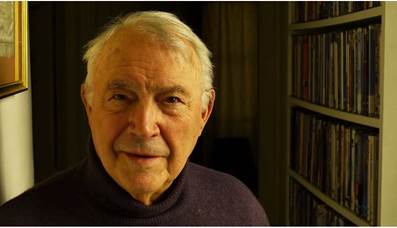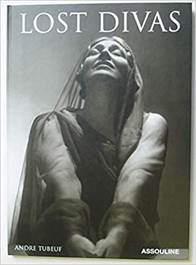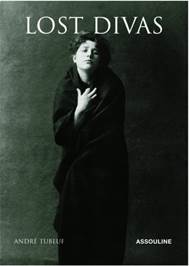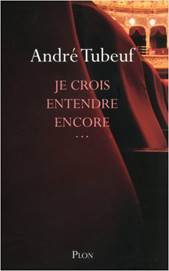
ANDRÉ TUBEUF (1930-2021), reminiscences by Charles Mintzer

I was fortunate to count André Tubeuf a colleague and friend, formed though our love of opera photographs and autographs, not a close friend in the traditional sense, but a kindred spirit. It all started in the early 80’s when as a volunteer at the Met Archives the late Bob Tuggle gave me some duplicate copies of the French publication “L’Avant Scene,” each issue devoted to a specific opera with essays, chronologies and historic photos. I noticed that André Tubeuf was often credited with wonderful, sometimes very rare, photos. I wrote to him care of the magazine, and we maintained a lovely exchange of letters and traded some photos, his were mostly of French origin and mine of American.
Fast forward to the year 2000 when with my friend Richard Miller we visited the grandchildren of Rosa Raisa in Rancho Mirage, California. I was still doing research on Raisa and I thought I might find some new information and any surviving papers the family might have kept. Seventeen years earlier I had previously visited Santa Monica and interviewed her daughter Giulietta Segala, and I had access to her documents and photos, but as a researcher you never know what you still might find. I had a long-established friendship with Suzanne Homme, granddaughter, but this time I also met her brother Giorgio Segala. It was at Giorgio’s home, previously the final residence of his mother, that he brought out from his garage a large carton containing the contents of Raisa’s desk at the time of her 1963 last hospitalization and death. There were interesting photos including a signed 1914 photo of Puccini dedicated to Rimini, praising his Jack Rance at Milan’s Dal Verme. Among the items in the carton were half a dozen hand-made postcards in some of Raisa’s exotic roles such as Isabeau and Basiliola in “La Nave” copied from period magazines and made into postcards. Raisa had both annotated and signed and dedicated the photos to André Tubeuf, but never mailed them. I told the grandchildren that I knew the gentleman and that I knew how to send them to him, explaining the circumstances. I received from André the most surprised letter about receiving autographed postcards from the grave, thirty-seven years previous. I told André that I was diligently at work writing the Raisa biography and promised to send him a copy when it was published, projected for late 2001. (As an aside, there were in that carton a set of snapshots of the 1950 televised Met “Don Carlo” that inaugurated Bing’s regime that were very rare; Rimini in addition to being a fine baritone was a camera buff and took the amateur photos of the performance from their circular tv. The grandchildren allowed me to give the snapshots to the Met Archives. I believe these are among the only documents extant of that historic televised performance).
Upon his receipt of the Raisa biography, André wrote me a rather formal thank-you: “Dear Mr. Mintzer, how much gratitude we owe you for such a love’s labor. The marvelous Record Collector article had already raised great expectations — but now! such an unaffected and knowledgeable writing! The dear Raisa’s soul must be elated somewhere above us. It is such a pity few artists find the biographies they deserve. Here for once it is achieved.”
He went on about some of the rare details in the book and requested copies of one of the rare Turandot photos that I published. I helped him with the photo he wanted and over the next several years we had occasional correspondence. In 2013 on a trip to Europe with my friend Richard, we met Rudi van den Bulck, already a friend and colleague, made even closer with my work on his website, operanostalgia.be. After two weeks of heavy touring in Belgium, and the Normandy area of France, we went to Paris to view, among other places of interest, an exhibit at the Opera of historic women singers, of which André had been a consultant. I had arranged for the three of us to visit his home and dine out, but he insisted on cooking for us. We spent several wonderful hours exchanging our opera and singers stories, as well as viewing some of his remarkable collections.
He told us much of his own life and this included personal recollections of his friendships with Germaine Lubin, Lotte Schöne, and some French stars of the past. He even knew Maria Kuznetsova, quite elderly at the time, who lived in Paris after the revolution in Russia. I remember specifically his telling us about Lubin’s troubles after the war and how to get away from all the negativity about her she would go to Mario Lanza movies which she loved. In his working years he was a teacher in Strasbourg, which enabled him in the summer months to cross the border into Germany where singers like Lotte Lehmann and Helene Wildbrunn summered at one of the nearby spas; that is how he had over a hundred signed Viennese photos of Wildbrrunn. Richard was particularly interested in Félia Litvinne, and knew so much about her and her career. So did André, and he showed us some very rare Litvinne photos.
When the great director Patrice Chereau passed away I told Rudi of this website that I had a rare photo of his mother, the opera singer Abbey Richardson Chereau, which I bought from the Leo Riemens collection. But I wanted to make sure that I was correct in my assumption of Chereau’s part-American heritage so I asked Andre if I was correct. He told me that Richardson was not his mother. She had married a different Chereau. That was good enough for me.
My final André story involves the great Ward Marston. Over the years I was one of the principal providers of photographs for Ward’s acclaimed albums. Ward was producing a set of cd’s of the estimable American baritone Arthur Endreze whose major career was in France, but all I had of him in my collection was a letter, alas no usable photos. Other Marston contributors of photos, the late Roger Gross for instance, did not have enough usable photos needed for the cd booklet. I scratched my head and I put Ward in touch with Tubeuf, and this turned out to be not a one-off, but a lasting relationship; Ward and Andre bonded, not only over French opera singer photos, but on personal issues as Ward is a Francophile with deep family French associations and history. André subsequently wrote unique essays for Marston’s Lubin and Schöne issues.



One of André’s final books was his over-sized coffee-table book, “Lost Divas” where he produced full sized photos of about forty glamorous singers of the past and accompanying informational essays. The final singer eulogized was Rosa Raisa, and I appreciated that much of that essay was information that came from my biography of her. I felt he was sending me a message.
André was one of the last critics of the operatic scene grounded in the great legacy of recordings and personal acquaintances with operatic luminaries. I am told that his French is very elegant and unique, not the standard. When I met him in person his use of the internet was only for email. Someone must have convinced him to post his writings on a website which he embraced. He will be greatly missed.